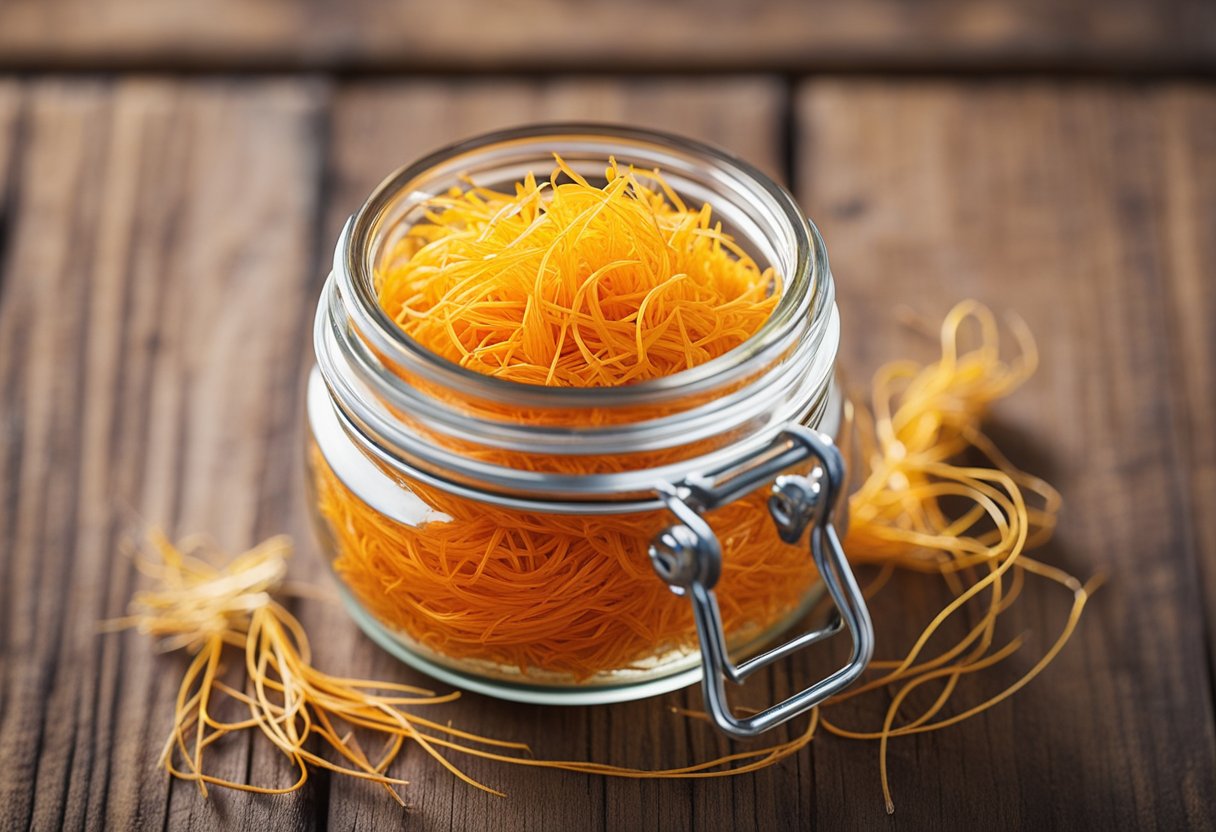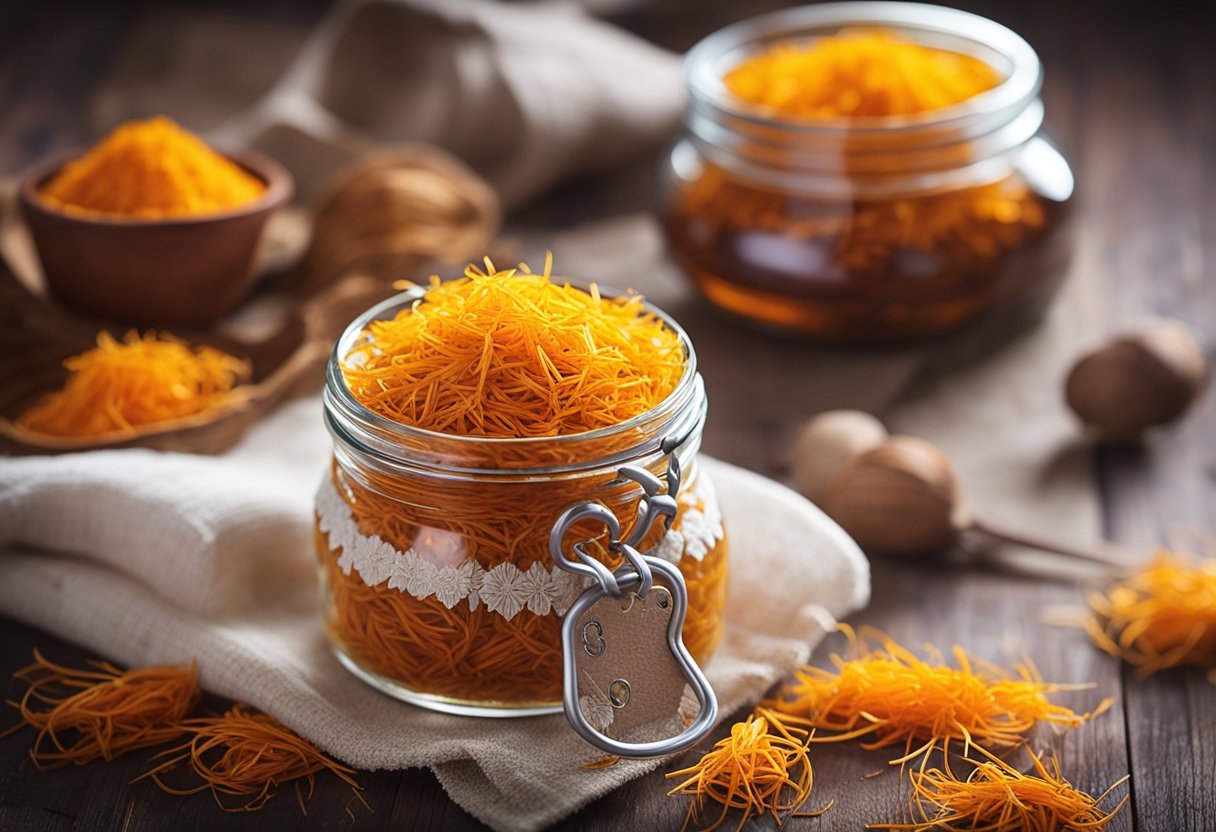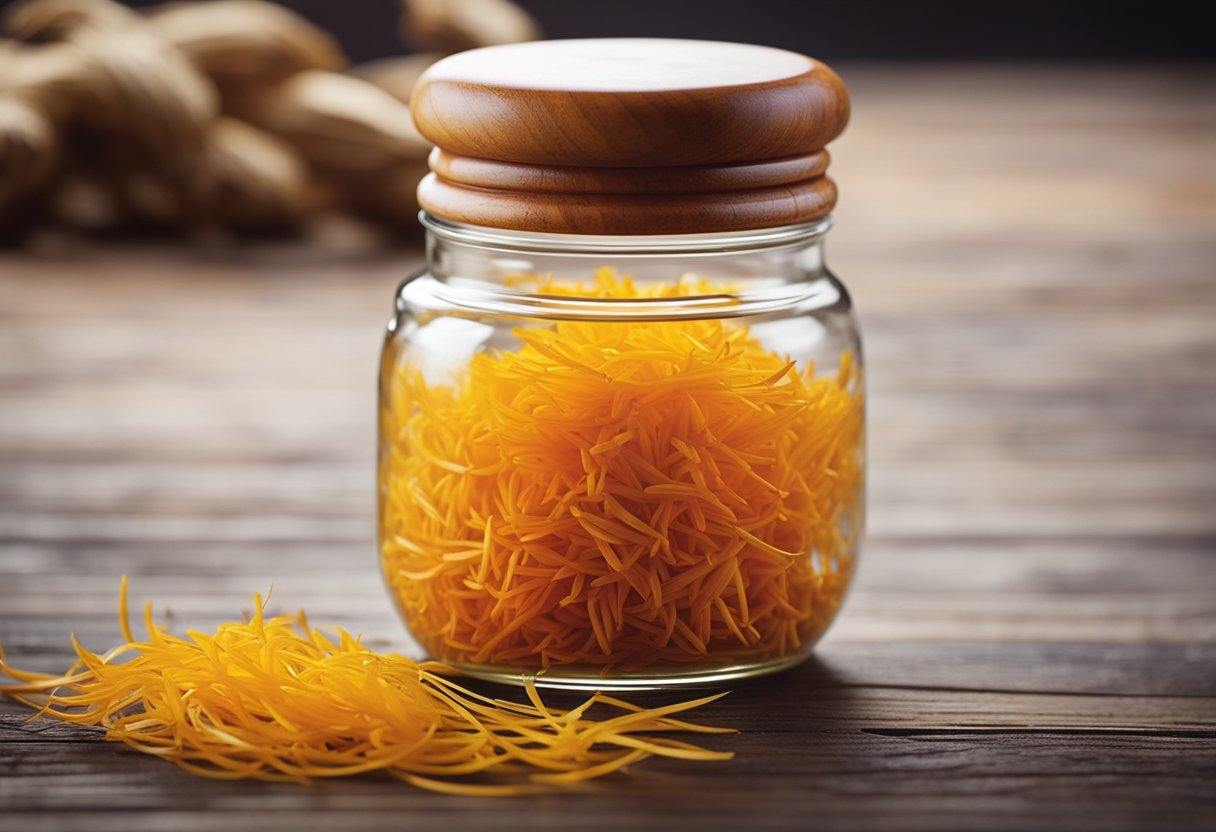As a spice known for its distinct flavor, saffron is a popular ingredient in many dishes around the world.
However, due to its high cost, it’s essential to know how long saffron can keep to avoid wasting money. So, how long does saffron keep?

The shelf life of saffron depends on various factors, including the quality of the spice, how it’s stored, and the form in which it’s purchased.
Pure saffron that’s stored correctly can last up to three years before losing its flavor.
However, if the spice has been mixed with other ingredients or has been exposed to light and moisture, it can go bad quickly, losing its quality and potency.
Key Takeaways
- Saffron can last up to three years if stored correctly.
- The quality of the spice and how it’s stored can affect its shelf life.
- Saffron’s high cost makes it essential to know how to store it properly to avoid waste.
Understanding Saffron

Harvest and Quality
Saffron is a spice that comes from the stigmas of the crocus flower. These stigmas are harvested by hand and are then dried to create the saffron threads that we use in cooking.
The harvest date is crucial to the quality of the saffron. The fresher the saffron, the better the flavor and aroma.
The quality of saffron is determined by the color, aroma, and flavor of the threads. Pure saffron is expensive because it takes a lot of flowers to produce a small amount of threads.
The threads should have a deep red color and a strong aroma. The flavor should be slightly sweet and floral with a hint of bitterness.
Saffron as a Spice
Saffron is a versatile spice that is used in many dishes. It is commonly used in rice pilaf and curry, but it can also be used as a seasoning for meats and vegetables.
It is important to use saffron sparingly because it is expensive and has a strong flavor.
When using saffron, it is best to soak the threads in hot water or broth before adding them to the dish. This helps to release the flavor and color of the saffron.
Saffron can also be ground into a powder and used in recipes.
Health Benefits of Saffron
Saffron contains antioxidants that can help protect the body from damage caused by free radicals. It has also been shown to have antidepressant properties and may help improve mood.
Additionally, saffron has been studied for its potential to prevent and treat cancer.
It is important to note that saffron should not be used in large quantities as it may have side effects. Pregnant women should also avoid using saffron as it may stimulate contractions.
Overall, saffron is a valuable spice that adds flavor and aroma to dishes while also providing potential health benefits. When buying saffron, it is important to look for high-quality threads that are fresh and have a deep red color.
Shelf Life of Saffron
As a spice, saffron is known for its unique flavor, fragrance, and color. It is derived from the stigma of the Crocus sativus plant and is considered one of the most expensive spices in the world.
However, like any other spice, saffron has a limited shelf life. In this section, I will discuss the factors that influence the shelf life of saffron and how to identify spoiled saffron.
Factors Influencing Shelf Life
Several factors can influence the shelf life of saffron. The most critical factors are light, moisture, heat, humidity, and oxygen.
Exposure to these factors can cause the saffron to spoil quickly. The following are the key factors that can affect the shelf life of saffron:
- Storage Temperature: Saffron should be stored in a cool, dry place at room temperature. Exposure to high temperatures can cause the saffron to lose its potency, flavor, and color.
- Air Circulation: Saffron should be stored in an airtight container to prevent air circulation. Exposure to air can cause the saffron to spoil quickly.
- Potency: Saffron’s potency decreases over time. The older the saffron, the less potent it becomes.
- Color: The color of saffron fades over time. Old saffron will have a pale yellow or brown color instead of a deep red color.
- Flavor: The flavor of saffron diminishes over time. Old saffron will have a weak or unpleasant taste.
- Fragrance: The fragrance of saffron fades over time. Old saffron will have a weak or unpleasant smell.
Identifying Spoiled Saffron
Saffron can spoil quickly if it is not stored correctly. Spoiled saffron can have an unpleasant taste, smell, and color. Here are some signs of spoiled saffron:
- Unpleasant Taste: Spoiled saffron will have a bitter or rancid taste instead of the sweet and floral taste of fresh saffron.
- Unpleasant Smell: Spoiled saffron will have a musty or moldy smell instead of the sweet and floral aroma of fresh saffron.
- Color: Spoiled saffron will have a pale yellow or brown color instead of a deep red color.
- Flavor: Spoiled saffron will have a weak or unpleasant taste.
- Fragrance: Spoiled saffron will have a weak or unpleasant smell.
In conclusion, saffron has a limited shelf life, and it is essential to store it correctly to maintain its potency, flavor, and color.
The factors that influence the shelf life of saffron are light, moisture, heat, humidity, and oxygen.
By following the storage guidelines and identifying the signs of spoiled saffron, you can ensure that your saffron stays fresh and flavorful for as long as possible.
Storing Saffron
When it comes to storing saffron, there are a few key factors to keep in mind to ensure that it stays fresh and flavorful for as long as possible. Here are some tips for proper saffron storage:
Proper Storage Containers
To keep saffron fresh, it’s important to store it in an airtight container that will protect it from exposure to air, moisture, and light.
Some good options for saffron storage containers include foil, plastic containers, or bags that can be sealed tightly to prevent air from getting in.
Ideal Storage Conditions
Saffron is sensitive to light and humidity, so it’s important to store it in a cool, dry place away from direct sunlight.
Room temperature is ideal for saffron storage, so a cabinet, cupboard, or pantry is a good place to keep it. Avoid storing saffron in the fridge or freezer, as this can affect its flavor and aroma.
Ground vs Whole Saffron
Ground saffron has a shorter shelf life than whole saffron threads, as it has a larger surface area that is exposed to air and moisture.
If you’re using ground saffron, it’s best to use it within six months of opening the container. Whole saffron threads can last up to two years when stored properly.
In summary, to store saffron properly, keep it in an airtight container in a cool, dry place away from direct sunlight.
Use whole saffron threads for longer shelf life, and ground saffron within six months of opening. By following these tips, you can ensure that your saffron stays fresh and flavorful for as long as possible.
Saffron Substitutes
As a pricey spice, saffron can be difficult to come by and may not be readily available in some areas. Fortunately, there are several substitutes that can be used in place of saffron in various dishes.
Turmeric and Safflower
Turmeric is a popular substitute for saffron due to its similar color and flavor. To use turmeric as a substitute, simply add a small amount of turmeric to the dish until the desired color is achieved.
Be cautious not to add too much turmeric, as it can overpower the dish and alter the flavor. Safflower is another option that can provide a similar color to saffron, but it does not have the same flavor profile.
Paprika and Other Spices
Paprika is another substitute that can be used to mimic the color of saffron. It has a mild flavor and is often used in dishes that require a smoky or sweet taste.
To use paprika as a substitute, simply add a small amount to the dish until the desired color is achieved. Other spices such as annatto, cumin, and coriander can also be used to add color and flavor to a dish.
When substituting saffron with other spices, it is important to note that the flavor profile may differ from the original recipe.
It is best to experiment with small amounts of the substitute spice and adjust the flavor as needed.
Additionally, when substituting saffron in a dish, it is important to consider the dish’s overall flavor profile and adjust the substitute spice accordingly.
In summary, there are several substitutes that can be used in place of saffron in various dishes. Turmeric and safflower can provide a similar color, while paprika and other spices can add both color and flavor.
When substituting saffron, it is important to experiment with small amounts of the substitute spice and adjust the flavor as needed to achieve the desired result.
Related posts:
- How Long Does Curry Last in Room Temp, Fridge, and Freezer
- Do Pickles Expire? Your Guide to Pickle Shelf Life
Frequently Asked Questions

How long does saffron last in the refrigerator?
Saffron should not be stored in the refrigerator. It should be stored in a cool, dry, and dark place. The refrigerator is too humid and can cause the saffron to spoil more quickly.
How long can saffron be stored in a jar?
Saffron can be stored in a jar for up to two years if it is stored in a cool, dry, and dark place. The jar should be airtight to prevent moisture from getting in.
What happens if you consume expired saffron?
Expired saffron may not be harmful, but it will have lost its flavor and aroma. It is best to use saffron before it expires to get the most out of its flavor and health benefits.
Does saffron have a shelf life?
Yes, saffron does have a shelf life. It gradually loses its potency over time. When stored at room temperature, it can maintain its quality for about one to two years.
Should saffron be refrigerated or stored at room temperature?
Saffron should be stored at room temperature in a cool, dry, and dark place. The refrigerator is too humid and can cause the saffron to spoil more quickly.
Can liquid saffron go bad over time?
Yes, liquid saffron can go bad over time. It should be stored in an airtight container in the refrigerator and used within a few months.
